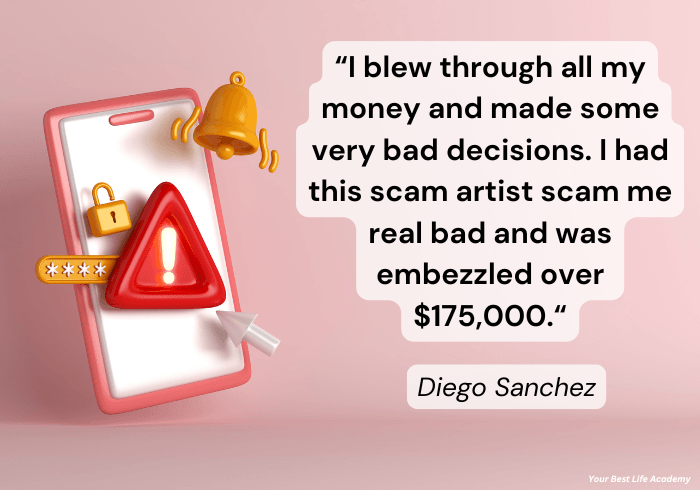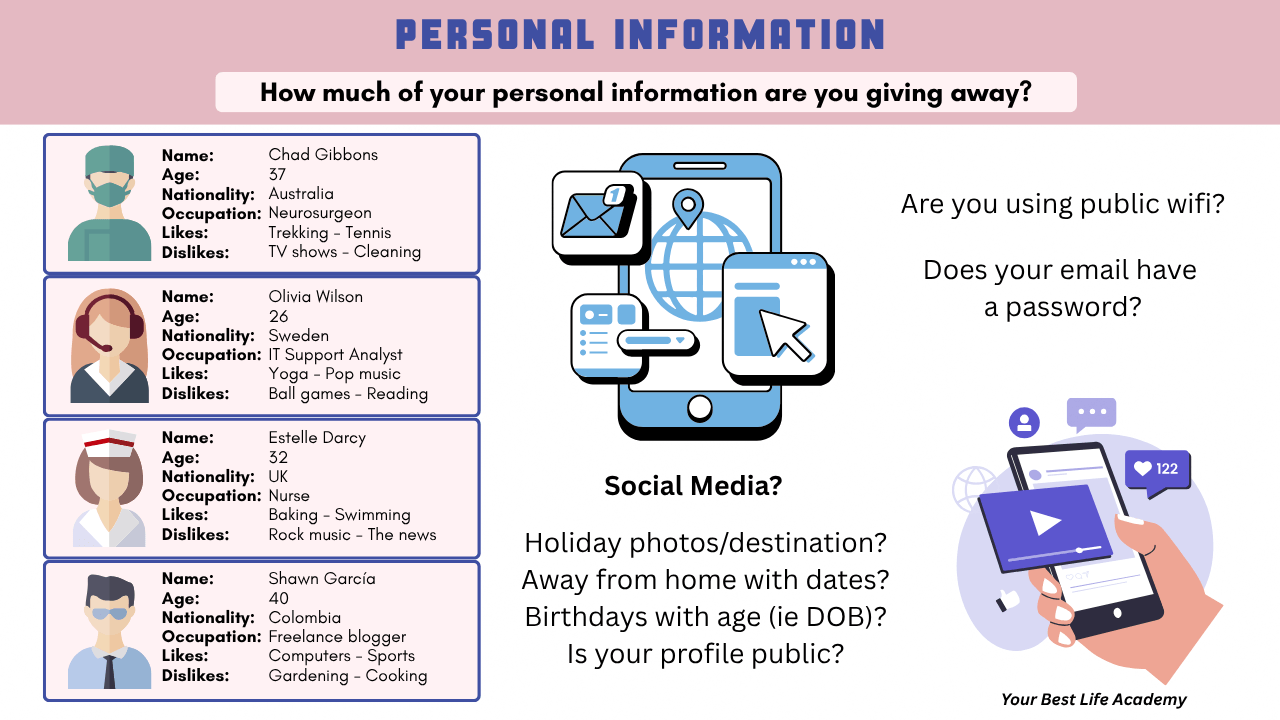How to Help Your Loved Ones Avoid Scams (and Protect Yourself, too)
Learn What To Look For in Scams
Published: 25 June 2025
Scams are everywhere, and they’re getting harder to spot. Whether it’s a phone call, email, or even social media message, it’s easy to fall for a scam — and harder to watch a loved one fall victim.
In this post, we’ll share simple steps you can take to protect yourself and your family. By learning how to spot red flags, you’ll feel more confident online and help keep your loved ones safe. Read on for practical tips and easy-to-use tools that could make all the difference.

Unfortunately People Get Hurt by Scammers
While it’s great to have an abundance mindset, it’s also important to take some practical steps to protect yourself (and your loved ones), as well as your finances, and personal information, from harm.
In today’s world, scams are everywhere. Unfortunately over the years I’ve known a few people who have fallen victim to scams (including someone close, recently). It can be really heart-breaking and soul-destroying to lose money to scams, so I thought I’d write about this, and share some tips, and things to look out for, so we are all more aware, and might think twice before something happens. Please also talk to loved ones about this – the more we remind people, and give them things to look out for, so they can protect themselves, the better. You could even go through this article with them, and explain all the things to look out for, if that would be helpful – or print out our free reminder sheet. If I can help even one or two people avoid scams, I’ll be happy.
Whether it's a fake email, a dodgy phone call, or a sneaky online ad, scammers are always trying new ways to trick people. While it’s sad that we have to be so alert to scams, the good news is, once you know what to look for, it’s much easier to spot a scam, and stay safe.
This blog will give some guidance on how to avoid scams with simple tips that could save a lot of heartache and missing funds or personal information being made public/being misused.
What Is a Scam?
A scam is when someone lies or tricks you to get your money, your personal information, or both. Scammers can contact you by phone, email, text, social media, or even in person. They often sound friendly, professional, or urgent – but don’t be fooled! This is part of the scheme, so you don't think rationally, or take the time to consider what they are saying.
1. Trust Your Gut
If something feels off, it probably is. Scammers often create a sense of panic or excitement to get you to act quickly without thinking. (One my friends was caught like this, while really busy.) If you're feeling unsure or pressured, take a step back. It's always okay to pause and check.
Quick tip - If you're being rushed into a decision — stop. Real companies and kind people won’t pressure you.
2. Look for Red Flags
Here are some common signs of a scam:
They ask for money upfront (especially via gift cards, wire transfers, or cryptocurrency).
You’re told you’ve won a prize or competition you didn’t enter.
They want personal details like your bank info, passwords, or Social Security number.
The message is full of spelling mistakes or weird grammar.
They claim to be from a trusted company or government agency — but the email or phone number looks odd.
Keyword tip - Always double-check suspicious emails and messages before you click or reply.
3. Protect Your Personal Information
Never give your personal or banking details to someone you don’t fully trust. Scammers can sound very convincing, but once they have your details, they can steal your identity, and/or empty your bank account. I know a couple of people who were tricked into giving away personal information, and another person who had their identity compromised. It can take years to sort it all out, as well as a lot of frustration, wasted time, and difficulties proving who you are.
Helpful hint - If someone asks for your login, PIN, or security code — don’t give it. Real companies never ask for that info out of the blue.

4. Use Safe Websites
When shopping online or filling out forms, always check that the website is secure. There are a few things to look for to check this.
The web address should start with https:// (the “s” means secure).
Look for a small padlock icon in the address bar.
Stick to websites you know and trust.
Online shopping safety tip - Be careful with online deals that seem too good to be true — they often are. I know I’ve wanted to buy something a few times online, but didn’t fully trust the website, so didn’t buy. Check the online reviews (of independent sources) before you buy - if it has a lot of bad reviews, heed the warning.
5. Don’t Click on Suspicious Links
Scammers love sending links that lead to fake websites. If you click them, they might try to steal your personal info, or install a virus on your device. Double-check them before you click on them. I know at work once, I reported an email to IT asking them about it, and it was malicious.
What to do - If you get a strange link from someone (even if you know them), don’t click. Ask them first if it’s legit.
6. Keep Your Devices Updated
Regular updates on your phone, computer, and apps help keep scammers out. Updates often include security fixes that block new scam tricks.
Bonus tip - Install reputable antivirus software and turn on automatic updates if you can.
7. Be Extra Careful With Phone Calls and Texts
Scammers often pretend to be from your bank, the tax office, or even the police. If someone calls or texts asking for money or personal info, hang up or don’t reply. Then call the official number to check if it was real. (I usually block the number immediately.)
8. Don’t say anything too quickly — scammers can record your voice and use it later. When I answer a call from an unknown number, I don’t talk. I wait – and if it is legitimate, they will talk to me. If not, they hang up – and I immediately block the number. AI can use snippets of your voice to re-create your voice and scam a loved one – which they can get details of from your social media or emails – or medicare cards (Australian) if you’ve been caught up in a company-wide ID theft (or 5, like I have). 😥
9. Check Before You Pay
Whether it's an online seller, a tradesperson, or a ‘new opportunity’ — check external reviews, ask around, and see if they have a real business website or phone number. Don’t pay until you’re sure they’re legit.
I’ve also heard of scams where an expected invoice was captured, doctored to a new account, and then sent – and paid.
Both the payer and the payee missed out. It’s good practice to call the number and double-check the account number, especially if it's changed from the normal one, or if it’s a large amount.
10. If in doubt, talk it out — ask the requester with a phone call, to check the account number again - or if not an invoice, ask a trusted friend or family member before you send money.

11. Report Scams
If you think you've come across a scam, report it. It helps others stay safe too.
Depending on your country, you can report scams to:
Australia: Scamwatch.gov.au
USA: ReportFraud.ftc.gov
Or your local police
12. Stay Informed
Scams are always changing. Keep learning about the latest ones, so you’re always one step ahead. Sometimes banks and phone companies sent emails to alert you to the latest scams – read them if you can. You might even want to sign up for scam alerts in your country.
Free Checklist - How to Avoid Scams: Simple Tips to Stay Safe
To help you discuss these tips with loved ones, I've created a 3 page document that you can print out and discuss (or put on your fridge). A few minutes can save a lot of anguish and pain and loss - whether for yourself, or your loved ones.
Check it out here.
Checking your bank accounts regularly can help you spot it earlier, as well. While it won't stop the scam, the earlier it is picked up and reported, the better.
Final Thoughts
Staying safe from scams isn’t about being scared — it’s about being aware. You don't need to spend your life exploring everything that can go wrong — however having a good awareness can help you stay alert when tired. With these simple tips, you can help protect yourself and help others do the same.
Remember - If it sounds too good to be true, it probably is. Slow down, ask questions, and trust your instincts. Sometimes your subconscious picks up clues that you’re not consciously aware of.
🙋 Frequently Asked Questions
1. What should I do if I think I’ve been scammed?
Stay calm. Contact your bank or credit card provider right away to block any payments. Change your passwords, especially for any accounts involved. Report the scam to your local authorities, or official scam reporting service.
2. How can I tell if an email or message is a scam?
Look for poor spelling, strange links, and unusual sender addresses. Scammers often try to create urgency, like “Act now or your account will be locked.” Always double-check by contacting the company directly through their official website.
3. Are phone scams still common?
Yes (someone close to me was caught by this recently, and lost a lot of money). Scammers often pretend to be from your bank, the government, or tech support. Never give personal info or payments over the phone unless you’re 100% sure who you're speaking to.
4. What’s the safest way to shop online?
Use secure websites that start with https:// and have a padlock symbol in the browser bar. Stick to brands and stores you trust, and check for real reviews before buying.
5. Can scammers get my info through social media?
Yes. Be cautious with what you share online. Scammers can use your public details to guess passwords or create fake accounts. They can also use that information to contact your friends and relatives pretending to either be you, or to help you. Avoid clicking on suspicious links or accepting friend requests from people you don’t know.
6. What should I do if someone I know sends a weird link?
Don’t click it. Their account might be hacked. Message them through another method (like text or phone) to check if it was really them.
7. Are older adults more at risk of being scammed?
Yes, unfortunately. But anyone can be a target. It’s helpful to talk openly with family and friends of all ages about common scams, and how to stay safe. Reminders help this stay top of mind, which will reduce the chances of people being caught unaware.
8. Should I report scams, even if I didn’t lose money?
Yes! Reporting scams helps authorities track down scammers, and warn others. Every report makes a difference.
9. How can I stay updated about new scams?
Subscribe to scam alert emails from your government’s scam website, or follow trusted cybersecurity pages on social media. Many banks and other institutions send our emails to warn of scams as well. Staying informed is one of the best ways to protect yourself.
10. What’s the #1 rule to remember to avoid being scammed?
Slow down and double-check. If something feels urgent, strange, or too good to be true — it probably is. Take a breath, and ask someone you trust.
📚 Additional Resources
Another way to stay on top of your finances is to be aware of your spending. Our free Spending Awareness Checklist & Simple Strategies can help you with that.
If you'd like to increase your sense of abundance (pretty much everyone, right?), our free Abundance Starts Within 7-Day Challenge can help.
Want more practical ideas and thought-provoking content on a regular basis? Don’t miss out on all the hints & tips that you can implement over time! Sign up for weekly input to help you uplift your life – one week at a time!
We have also created stand-alone pages in the 7 life segments with all blogs, freebies, and paid products grouped together, so you can easily find and review items of interest to you. Click on the links below to find the areas of most interest to you!
Life Purpose & Best Life - Health & Wellness - Relationships - Abundance - Personal Growth - Peace of Mind - Spirituality & Energy.
📖 References/Further Reading
📝 Disclaimer
This blog is for general information and awareness only. It is not intended to be financial advice or legal advice of any kind. I am not a licensed financial adviser and am not authorised to provide financial advice, including general advice, under Australian law.
Scam tactics can change quickly, so always do your own research and seek advice from a qualified professional (such as a licensed financial adviser, legal professional, or cybersecurity expert) if you need help. Your safety and peace of mind matter — stay informed and take care online.
Your Best Life Newsletter
Your Weekly Dose of Inspiration to Live Your Best Life!
✔️ Get practical tips to feel happier, healthier, and more fulfilled.
✔️ Discover easy ways to bring more joy and purpose into your life.
✔️ Be the first to know about new blogs, free resources, and special offers.
💌 Join our supportive community today — it's free!




